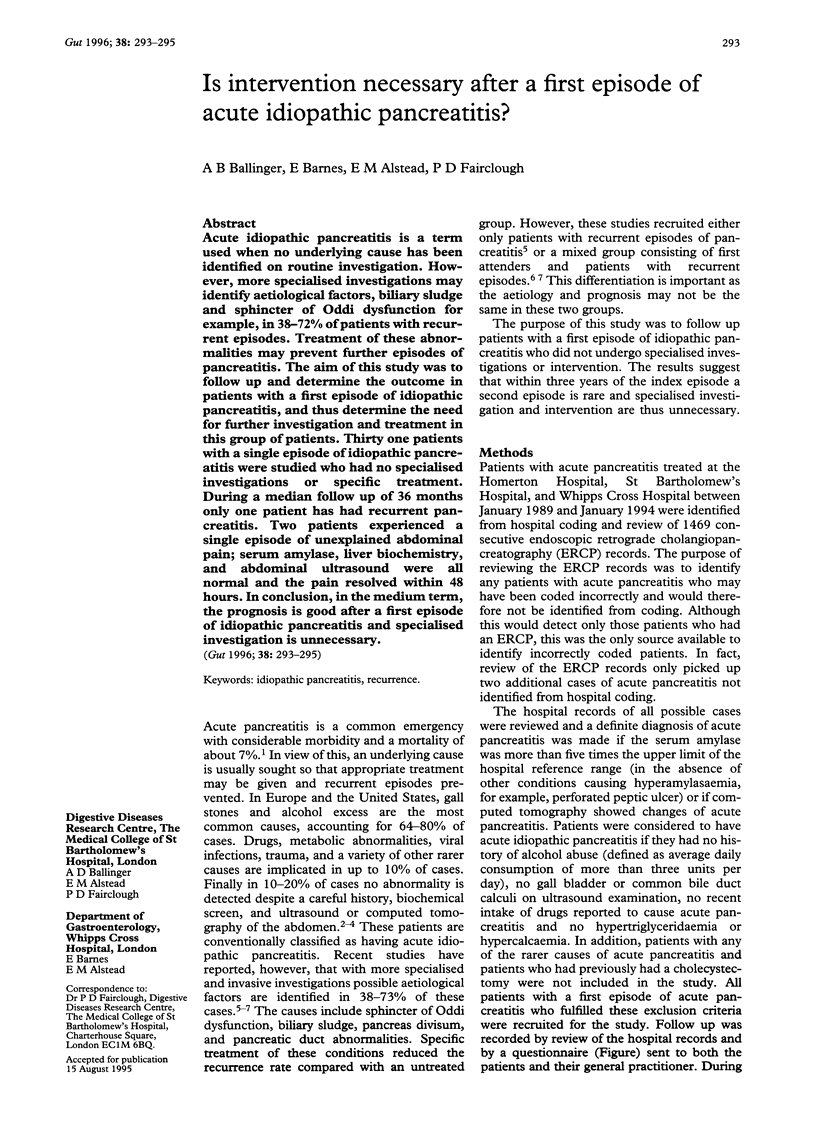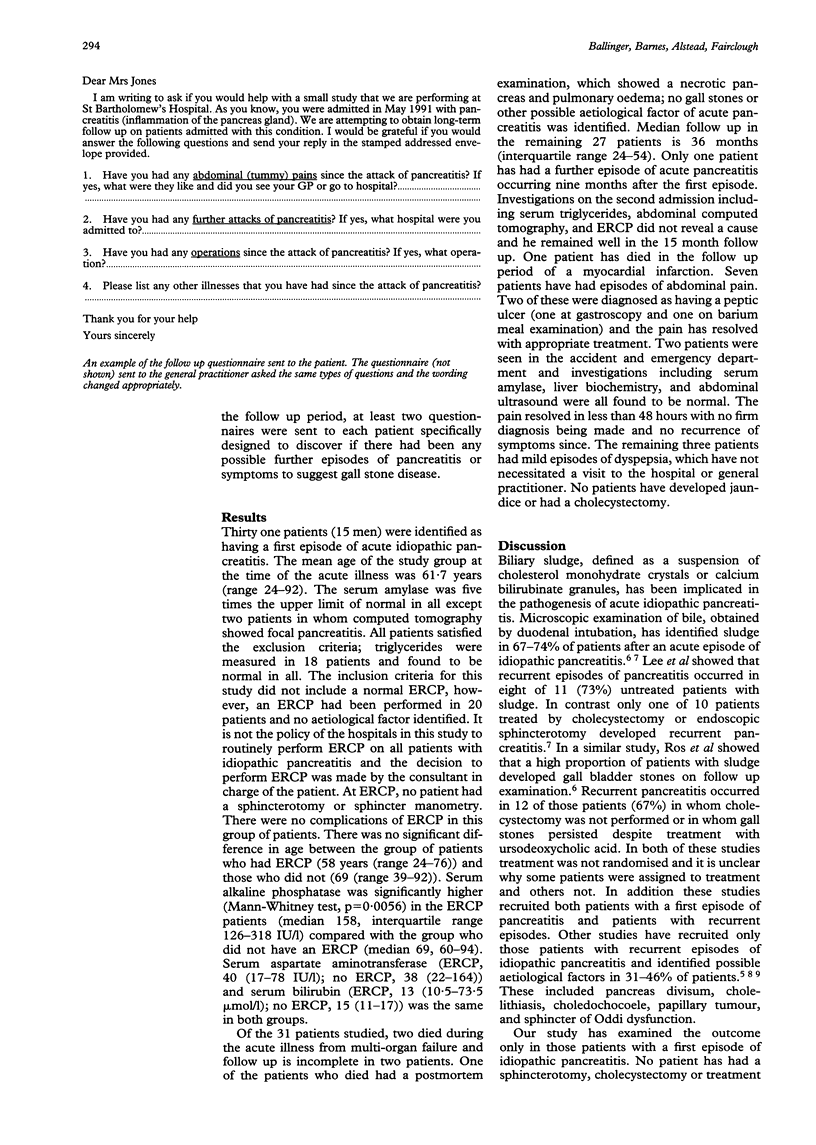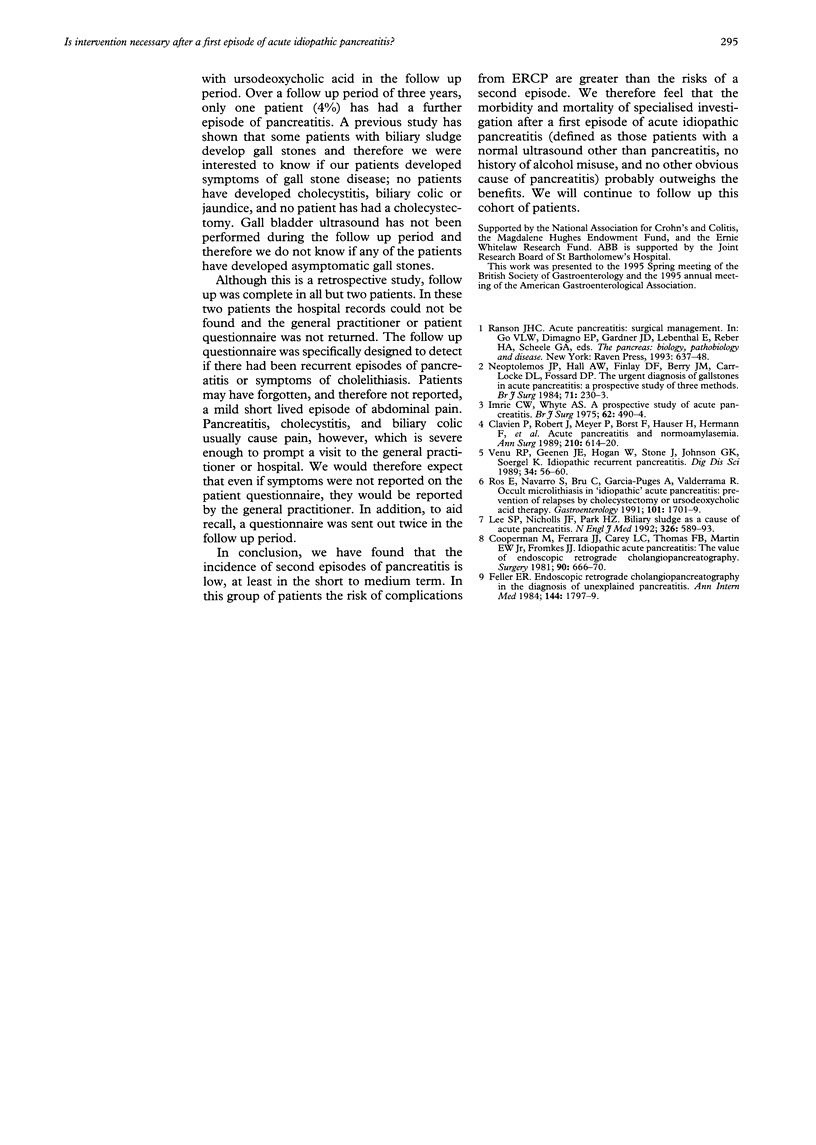Abstract
Acute idiopathic pancreatitis is a term used when no underlying cause has been identified on routine investigation. However, more specialised investigations may identify aetiological factors, biliary sludge and sphincter of Oddi dysfunction for example, in 38-72% of patients with recurrent episodes. Treatment of these abnormalities may prevent further episodes of pancreatitis. The aim of this study was to follow up and determine the outcome in patients with a first episode of idiopathic pancreatitis, and thus determine the need for further investigation and treatment in this group of patients. Thirty one patients with a single episode of idiopathic pancreatitis were studied who had no specialised investigations or specific treatment. During a median follow up of 36 months only one patient has had recurrent pancreatitis. Two patients experienced a single episode of unexplained abdominal pain; serum amylase, liver biochemistry, and abdominal ultrasound were all normal and the pain resolved within 48 hours. In conclusion, in the medium term, the prognosis is good after a first episode of idiopathic pancreatitis and specialised investigation is unnecessary.
Full text
PDF


Selected References
These references are in PubMed. This may not be the complete list of references from this article.
- Clavien P. A., Robert J., Meyer P., Borst F., Hauser H., Herrmann F., Dunand V., Rohner A. Acute pancreatitis and normoamylasemia. Not an uncommon combination. Ann Surg. 1989 Nov;210(5):614–620. doi: 10.1097/00000658-198911000-00008. [DOI] [PMC free article] [PubMed] [Google Scholar]
- Cooperman M., Ferrara J. J., Carey L. C., Thomas F. B., Martin E. W., Jr, Fromkes J. J. Idiopathic acute pancreatitis: the value of endoscopic retrograde cholangiopancreatography. Surgery. 1981 Oct;90(4):666–670. [PubMed] [Google Scholar]
- Feller E. R. Endoscopic retrograde cholangiopancreatography in the diagnosis of unexplained pancreatitis. Arch Intern Med. 1984 Sep;144(9):1797–1799. [PubMed] [Google Scholar]
- Imrie C. W., Whyte A. S. A prospective study of acute pancreatitis. Br J Surg. 1975 Jun;62(6):490–494. doi: 10.1002/bjs.1800620615. [DOI] [PubMed] [Google Scholar]
- Lee S. P., Nicholls J. F., Park H. Z. Biliary sludge as a cause of acute pancreatitis. N Engl J Med. 1992 Feb 27;326(9):589–593. doi: 10.1056/NEJM199202273260902. [DOI] [PubMed] [Google Scholar]
- Neoptolemos J. P., Hall A. W., Finlay D. F., Berry J. M., Carr-Locke D. L., Fossard D. P. The urgent diagnosis of gallstones in acute pancreatitis: a prospective study of three methods. Br J Surg. 1984 Mar;71(3):230–233. doi: 10.1002/bjs.1800710324. [DOI] [PubMed] [Google Scholar]
- Ros E., Navarro S., Bru C., Garcia-Pugés A., Valderrama R. Occult microlithiasis in 'idiopathic' acute pancreatitis: prevention of relapses by cholecystectomy or ursodeoxycholic acid therapy. Gastroenterology. 1991 Dec;101(6):1701–1709. doi: 10.1016/0016-5085(91)90410-m. [DOI] [PubMed] [Google Scholar]
- Venu R. P., Geenen J. E., Hogan W., Stone J., Johnson G. K., Soergel K. Idiopathic recurrent pancreatitis. An approach to diagnosis and treatment. Dig Dis Sci. 1989 Jan;34(1):56–60. doi: 10.1007/BF01536154. [DOI] [PubMed] [Google Scholar]


